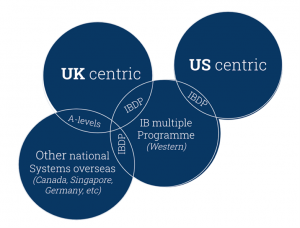I doubt anyone reading this article woke up this morning thinking about regionalization. But even if you weren’t, it is still affecting you. This article onsiders a subtle but significant change happening around us, and one that will affect us as international educators.
Regionalization instead of Globalization
Regionalization is a process of moving away from global trade and politics and towards a specific region or bloc. This drift away from globalization is not the sort of change that grabs headlines, so you may not have noticed it. But globalization, as measured by global trade, is slowing and possibly even flatlining.
Meanwhile, as the Economist magazine summarized in 2019, an “evolution of a new world order – a fully multipolar world composed of three (perhaps four, depending upon how India develops) large regions that are distinct in the workings of their economies, laws, cultures and security networks – is manifestly underway”.
Four years later, Covid and the war in Ukraine have accelerated these forces. Today, governments, and to a certain extent companies, are worried about supply chain resiliency and security as much as they are about cost. Examples of this include Russia and China officially expanding their trading relationship/bloc, and the US having just enacted the “Chip Act” to limit Chinese access to American technology.
As international educators, we should not underestimate the importance of commercial trade. When groups of people exchange goods and services, they develop cultural connections and normally understand each other better.
Developing a shared understanding between groups is, of course, one of the tenets of an international education. If global trade changes, international education will as well. Furthermore, strong arguments can be made that globalization and interdependent trade networks have made the world safer: trading nations have more to lose if they go to war. But, as evidenced by the war in Ukraine, major conflict between different countries is back.
Regionalization within international education
Like regional trade blocs within the global economy, international education has its own clusters. (See figure showing a Network Clustering of International Schools).

This is a big topic and a short article, but to briefly illustrate this point, consider professional learning. Educators in each of the clusters in the figure tend to gravitate towards their own conferences and training. However, if schools offer the same curriculum (such as the International Baccalaureate Diploma Programme, IBDP) then teachers from different networks are likely to interact. Otherwise, they are unlikely to share professional development. The reality is that different curriculum types of international school generally do not need each other, just like countries are deciding they do not need countries outside of their own bloc.
You will also notice that, within this discussion, two of the biggest circles in the Figure represent national Western curriculum models. Yes, these are national approaches to curriculum, but American and British overseas schools almost always have international elements of their educational programme so I include them. Some argue that the IB is one of the few “truly international” curricula. But, as others have pointed out before me, the IB’s origins are Western as all four IB programmes (Primary Years Programme, Middle Years Programme, Career-related Programme, Diploma Programme) emerged from Western thought and values. International education may not be a national curriculum, but it largely remains a Western bloc education.
Incidentally, referring again to the figure, in many large cities around the world with international schools we see a similar pattern emerge: two or three leading schools representing the major “international” curriculum offerings, then a mixture of smaller, “second tier” schools sometimes offering different national curricula. Things tend to evolve a little like a shopping mall with a few big, well-branded anchor stores complemented by a range of smaller offerings. Market forces shape international education in many ways, and changes in trade patterns will impact us in a number of respects.
Likely impacts of regionalization on international education
Demand for a greater balance between regional and global education:
Regionalization is also a mindset and, as its popularity grows, we can expect parents and local governance to insist upon more regional and nativist elements within an international school’s learning programme. Graduates of schools outside of the Western bloc are more likely to consider regional universities (especially as non-Western universities improve in global rankings) instead of only Western ones. Related to this, anticipate that international schools will offer more bilingual programs, especially in the lower grades.
Fewer mission statements referencing “Becoming a global citizen”
The idea of “becoming a global citizen” will not be universally accepted as a good educational outcome. Instead, expect to see more missions reflecting a balance between global citizenship and local values. This is part of the overall transition of international schools towards becoming more like regular independent schools. More people will refer to international education as Western education, especially as divisions between regions grow; not everyone will be interested in that for their children. Globalist will equal Western bloc.
More silos within international education
Given the overall growth of international schools, it makes sense that bigger clusters (eg IB, US and UK) within international education will become increasingly siloed and independent of each other. Without an explicit effort to connect people across school clusters, international educators may start acting more like educational regionalists existing in echo chambers of their our making, closing off from each other and looking inward.
International education as a force for peace
International education, from its genesis, was designed to be a force for peace. Interdependent global supply chains and the rise of democracy helped promote peace between nations. Regionalization presents a dangerous phase of global politics. If things continue down their current path, this generation of international students could experience a major war between nations and, possibly, between regional blocs. International educators need to return to our roots as a uniquely positioned powerful force for peace.
The shift to regionalization offers no dramatic elements that drive news cycles. But this is a big shift, and we will see its effects.
James MacDonald is Director of the International School of Brussels, having previously held posts including Head of School at NIST, Bangkok and Yokohama International School, Japan.
This article first appeared in the Autumn 2023 edition of International School magazine.




















